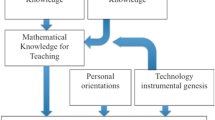Abstract
The CAME1 project was inaugurated in 1993 as an intervention delivered in the context of mathematics with the intention of accelerating the cognitive development of students in the first two years of secondary education. This paper reports substantial post-test and long-term National examination effects of the intervention, yet, by discussing the methodology used, questions the assumptions implicit in the original intention. It is now suggested that a better view is to regard CAME as a constructive criticism of normal instructional teaching, with implications for the role of mathematics teachers and university staff in future professional development.
Similar content being viewed by others
References
Adhami, M., Johnson, D.C. and Shayer, M.: 1998, Thinking Maths: the Programme for Accelerated Learning in Mathematics, Heinemann Educational Books, Oxford.
Baddeley, A.: 1990, Human Memory: Theory and Practice, Erlbaum, Hove.
Bloom, B.S. (ed.): 1956, Taxonomy of Educational Objectives: The Classification of Educational Goals: Handbook I, Cognitive Domain, Longmans, Green, New York.
Brown, M.: 1989, ‘Graded assessment and learning hierarchies in mathematics–an alternative view’, British Educational Research Journal 15(2), 121–128.
Brown, M.: 1992, Graded Assessment in Mathematics: Teacher's Guide, Nelson, London.
Bruner, J.: 1968, Towards a Theory of Instruction, W.W. Norton, New York.
Case, R.: 1992, The Mind's Staircase, Erlbaum, Hillsdale, NJ.
Collis, K.F.: 1978, Chapters 7 and 8 in: J.A. Keats, K.F. Collis and G.S. Halford (Eds.), Cognitive Development: Research Based on a Neo-Piagetian approach, John Wiley and Sons, New York.
Davis, B. and Simmt, E.: 2003, ‘Understanding learning systems: Mathematics education and complexity science’, Journal for Research in Mathematics Education 34(2), 137–167.
Demetriou, A., Platsidou, M., Efklides, A., Metallidou, Y. and Shayer, M.: 1991, ‘The development of quantitative-relational abilities from childhood to Structure, scaling, and individual differences’, Learning and Instruction 1(1), 19–43.
Demetriou, A.: 2005, Emergence, nature and functions of g: A response to Kanazawa and an alternative model. (Article submitted for publication)
Duncan, J., Seitz, R.J., Kolodny, J., Bor, D., Herzog, H., Ahmed, A., Newell, F.N. and Emslie, H.: 2000, ‘A neural basis for general intelligence’, Science 289(5478), 457–460.
Embretson, S.E.:1968, ‘Diagnostic testing by measuring learning processes: Psychometric considerations for dynamic testing’, in Test Design: Developments in Psychology and Psychometrics, Academic Press, New York.
Feuerstein, R., Rand, Y., Hoffman, M. and Miller, M.: 1980, Instrumental Enrichment: An Intervention Programme for Cognitive Modifiability, University Park Press, Baltimore.
Halford, G.S.: 1982, The development of thought, Erlbaum, Hillsdale, NJ.
Hart, K. (ed.): 1981, Children's Understanding of Mathematics: 11–16, John Murray, London.
Inhelder, B. and Piaget, J. 1958, The Growth of Logical Thinking From Childhood to Adolescence, Routledge, London.
Piaget, J.: 1950, The Psychology of Intelligence, Routledge, London.
Piaget, J.: 1953, The Origin of Intelligence in the Child, Routledge, London.
Piaget, J.: 1972, ‘Intellectual Evolution from Adolescence to Adulthood’, Human Development 15, 1–12.
Noelting, G.: 1980, ‘The Development of Proportional Reasoning and the Ratio Concept. Part I – differentiation of stages’, Educational Studies in Mathematics 2, 217– 253.
Rasch, G.: 1980, Probabalistic Models for Some Intelligence and Attainment tests, University of Chicago Press, London.
Shayer, M.: 1999, ‘Cognitive acceleration through science education II: Its effects and scope’, International Journal of Science Education 21(8), 883–902.
Shayer, M.: 2003, ‘Not just Piaget; not just Vygotsky, and certainly not Vygotsky as alternative to Piaget’, Learning and Instruction 13, 465–485.
Shayer, M. and Adey, P.S. 1981, Towards a Science of Science Teaching, Heinemann Educational Books, London.
Shayer, M. and Adhami, M.: 2004, ‘Realising the cognitive potential of children 5–7 with a mathematics focus’, International Journal of Educational Research 39, 743– 775.
Shayer, M. and Beasley, F.: 1987, ‘Does Instrumental Enrichment work?’, British Educational Research Journal 13(2), 101–119.
Shayer, M., Demetriou, A., and Pervez, M.: 1988, ‘The structure and scaling of concrete operational thought: Three studies in four countries’, Genetic, Social and General Psychological Monographs 114, 309–375
Shayer, M., Küchemann, D.E. and Wylam, H.: 1976, ‘The distribution of Piagetian stages of thinking in British middle and secondary school children’, British Journal of Educational Psychology 46, 164–173.
Shayer, M. and Wylam, H.: 1978, ‘The distribution of Piagetian stages of thinking in British middle and secondary school children II: 14–16 year-olds and sex differentials’, British Journal of Educational Psychology 48, 62–70.
Smith, L. 2002, Reasoning by Mathematical Induction in Children's Arithmetic, Elsevier Science, Oxford.
Spearman, C.: 1927, The Abilities of Man: Their Nature and Measurement, Macmillan, London.
Tanner, J.M.: 1978, Foetus into Man: Physical Growth from Conception to Maturity, Open Books, London.
Vygotsky, L.S.: 1986 [A. Kozulin. ed.], Thought and Language, Cambridge, MIT Press, MA.
Wright, B.J. and Stone, M.H.: 1979. Best Test Design: Rasch Measurement, MESA Press, Chicago.
Author information
Authors and Affiliations
Rights and permissions
About this article
Cite this article
Shayer, M., Adhami, M. Fostering Cognitive Development Through the Context of Mathematics: Results of the CAME Project. Educ Stud Math 64, 265–291 (2007). https://doi.org/10.1007/s10649-006-9037-1
Received:
Accepted:
Published:
Issue Date:
DOI: https://doi.org/10.1007/s10649-006-9037-1




